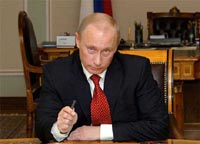Putin wants to focus EU summit on energy, visas
Russian President Vladimir Putin is hosting the European Union leadership for a summit colored by EU concerns about Russia 's reliability as a key energy supplier and Moscow 's persistent bid for European retail gas assets. Energy disputes and Russia's longtime push for easing visa procedures are expected to dominate the semiannual talks Thursday at Putin's Black Sea retreat with Austrian Chancellor Wolfgang Schuessel, whose country currently holds the EU presidency, European Commission President Jose Manuel Barroso and EU foreign policy chief Javier Solana.

"There are far more problems in Russia-EU relations now, compared with the previous summit (in October), and it doesn't look like there is a trend toward settling them," said Yevgeny Volk, the head of the Heritage Foundation's Moscow office. A brief disruption in Russian gas supplies to Western Europe early this year amid a price dispute with Ukraine tarnished Russia 's reputation as a reliable supplier and encouraged the EU to intensify a search for alternative supply routes. Ironically, the shutdown, which was followed by gas shortages amid a harsh winter, came as Russia declared energy security to be a top priority of its leadership this year of the Group of Eight leading industrialized nations.
European fears of excessive energy reliance on Russia, which supplies a quarter of Europe's gas and is its second-biggest supplier of oil, further rose amid talk that Russia's state-controlled Gazprom natural gas giant was considering acquiring Britain's largest gas istributor. When British officials warned of possible legal changes to block such a deal, Gazprom and even Putin himself angrily warned that the gas monopoly could refocus its future export strategy toward an energy-hungry eastern neighbor China .
" China has a huge interest in securing Russian energy supplies, and the Chinese alternative gives Russia a strong bargaining chip in talks with the Europeans," said Alexander Pikayev, a senior analyst with the Moscow-based Institute for Global Economy and International Relations. After the initial British outburst, British Prime Minister Tony Blair said there were no barriers to Gazprom and the Kremlin also toned down its rhetoric.
While the Europeans realize the measure of their dependence on Gazprom, the Kremlin clearly doesn't want a public spat with the EU coming on top of a growing rift with Washington that threatens to mar the G-8 summit in St. Petersburg , said Fyodor Lukyanov, the editor of Russia in Global Affairs magazine. "Even though outward tensions have abated, the controversy over Gazprom's push for retail gas markets in the EU nations in exchange for the Europeans' access to Russian resources has remained strong," Lukyanov said.
Gazprom struck an asset-swap deal with Germany 's BASF last month, underlining a special relationship with Germany Russia's biggest trade partner and largest single importer of gas, and the terminus of a widely touted gas export pipeline under the Baltic Sea . The deal raised Gazprom's stake in BASF marketing subsidiaries while increasing the German company's stake in a giant Siberian gas field. The Russian gas leviathan has held similar talks with Fluxys, the operator of Belgium 's national gas transport and distribution network, and Italy 's Eni SpA. "It wouldn't be surprising if there are other discussions under way," said Steven O'Sullivan, oil and gas analyst at Deutsche UFG in Moscow .
Putin aide Igor Shuvalov defended the assets exchange as "one of the most efficient instruments of ensuring global energy security." "You want our oil and gas? We will give it to you and in this way ensure stable global economic growth," Shuvalov told the daily Nezavisimaya Gazeta this week. "At the same time, our energy companies on a reciprocal basis will develop their business overseas."
In other energy-related disputes, the Kremlin has voiced irritation about the EU's keeping it in the dark about its prospective energy policy and Gazprom officials harshly criticized EU plans to deregulate the gas market, warning that could lead to a disruption in supplies. While there is little chance of any visible progress in talks over gas supplies, Putin and the EU leadership are expected to boast some progress on long-standing visa issues. Russia and the EU are to sign a readmission treaty that would oblige Moscow to take back illegal migrants the main EU condition for easing visa rules for some categories of Russian travelers in a separate document to be signed Thursday, reports the AP.
N.U.
Subscribe to Pravda.Ru Telegram channel, Facebook, RSS!


